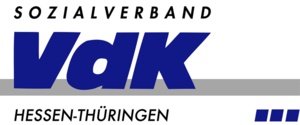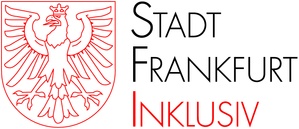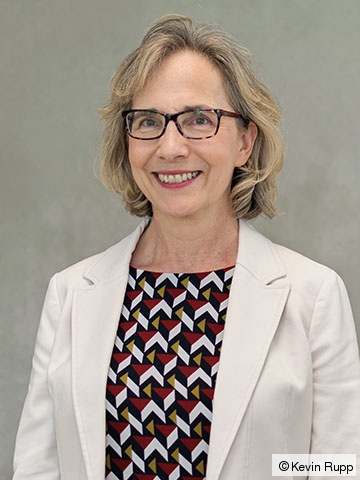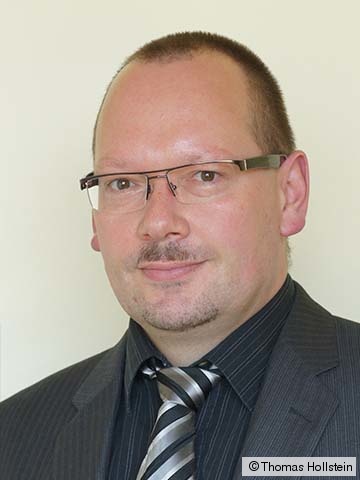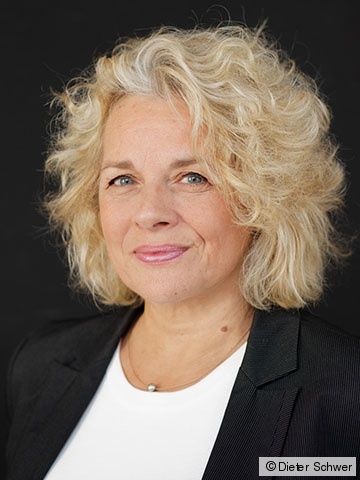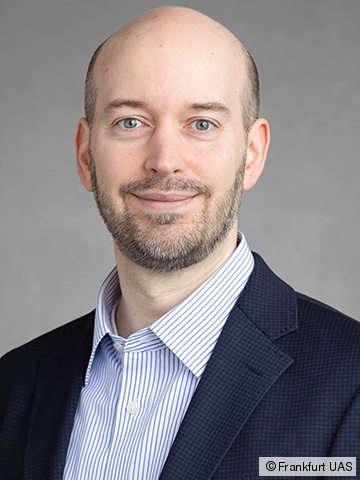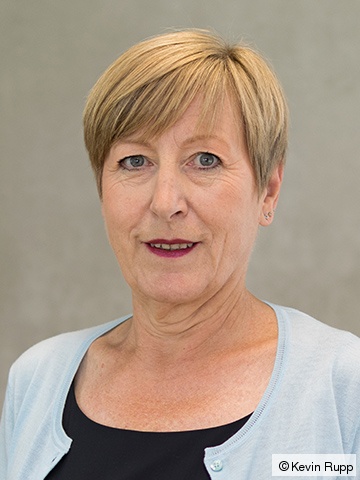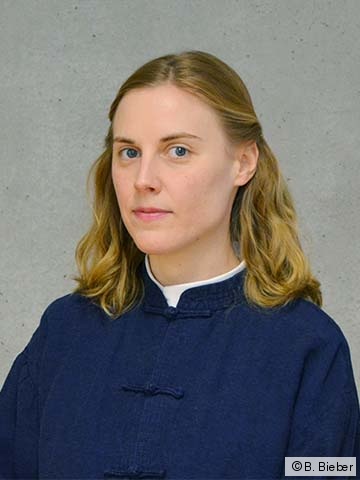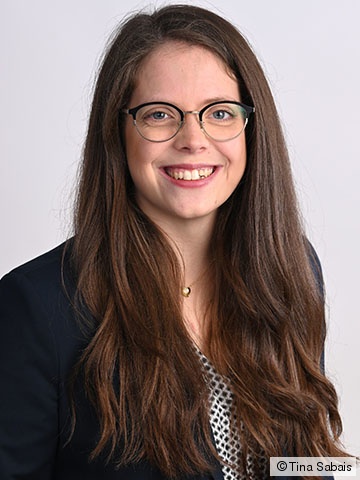Associate Members
Industry, social and health care organisations and associations can be accepted as associate members and/or cooperation partners of the research center FUTURE AGING.
Associate Members
Mobile solutions for industry & construction
Skill Software GmbH specializes in radically simplifying complex business processes for mobile delivery on smartphones and tablets. We offer Industry 4.0 solutions for construction and building management, energy and technology, customer and visitor flows. Another focus is project-oriented CRM, especially for the construction industry, i.e. digitally supported customer acquisition and customer management.
Together with the research center FUTURE AGING of Frankfurt UAS we develop the dynamic visitor guidance system "inGuide" for the more comfortable use of building complexes, clinics, universities, business parks, shopping centers and all kinds of campuses, and construction sites. The integrated indoor navigation leads to destinations, especially people with impairments receive appropriate support (barrier-free or opto-acoustic navigation). AI-supported, self-learning solution suggestions are also offered in the event of hazards or pandemics. "inGuide" is funded as a Hesse Excellence Project (LOEWE).
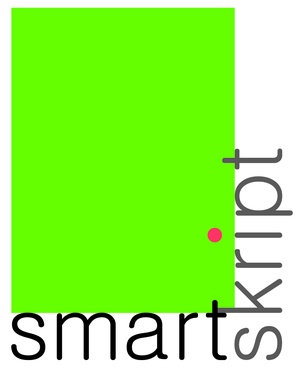
Smart Skript presents services and products in need of explanation relating to the sustainable planning, construction and operation of buildings in a linguistically and professionally competent manner. The office positions messages in such a way that they are perceived by the respective target groups. Why? For the joy of successfully building something new.
Since 2006, Bettina Gehbauer-Schumacher has been working independently as the owner of the "Smart Skript" office on projects dealing with technical, economic and social issues. She is motivated to develop and realise concepts specially tailored to her clients and to advance future-oriented topics. The focus is on shaping communication: Strategy, editing, events.
Bettina Gehbauer-Schumacher thinks in networks, acts strategically and seeks constructive dialogues with project partners. Her holistic approach is also documented by her degrees in architecture (TU), PR consultant (DPRG) and innovation manager (IHK).

PureLife is the AAL product label of the German company PureSec GmbH, located in Idstein. PureSec develops and distributes a wide range of AAL (Ambient Assisted Living) systems for elderly people.
Fall Detection and Sensors for the Health Care Sector
The PureLife product and service spectrum ranges from fall detection systems, new sensors for vital data recording, smart home solutions with intelligent home emergency call functions, to robot-assisted solutions for care facilities and private homes - always with the aim of enabling older people to live a safe, self-determined life in their familiar surroundings for as long as possible.
Service, Interfaces and Software Solutions
In addition to the sale and service of modern assistance systems from leading manufacturers worldwide, PureLife also develops its own solutions, e.g. an interface module for connecting sensor systems to nurse call systems in facilities, as well as a framework with senior-friendly programme modules (apps) for the PEPPER and TEMI robot systems. On the basis of this framework, practical solutions are developed for the use of humanoid robot systems in social institutions.
Partnerships
PureSec has many years of experience in the implementation of development projects, the implementation and operation of complex IT infrastructures and the implementation of data protection requirements in the pharmaceutical and healthcare sectors. PureSec is a certified sales and development partner of Temi Global Ltd. (TEMI robot), Softbank Robotics (humanoid robot PEPPER), Medisana and Vayyar Ltd.
PureSec GmbH
Wiesbadener Straße 30
65510 Idstein
https://smart-altern.de
Phone: +49 6126 9839909 Fax: +49 6126 224093 Mail:info@puresec.de
The Arbeiterwohlfahrt Frankfurt founded the Johanna-Kirchner-Stiftung [Johanna Kirchner Foundation] in 1951 with its headquarter in Frankfurt. The foundation's constitution defines its purpose as follows: "The foundation is to enable elderly people or people in need of care to spend their retirement in a secure environment". The Johanna-Kirchner-Stiftung thus pursues exclusively and directly charitable and benevolent purposes.
The " Johanna-Kirchner-Heim" built in Frankfurt's Gutleut district formed the starting point and core of the Johanna-Kirchner-Stiftung. In the meantime, the foundation has grown over the past decades into a modern and versatile provider of nursing and care for the elderly. The foundation includes three care facilities, a practice for physiotherapy and occupational therapy as well as a further education and training institute (FWIA).
Based on the mission statement of the Arbeiterwohlfahrt [non-statutory welfare organisation] and in commitment to the social and political engagement of its namesake Johanna Kirchner, the Johanna-Kirchner-Stiftung has its own programmatic mission statement. It puts the foundation's purpose into concrete terms. At the same time, full-time and voluntary staff find in it a clear and meaningful orientation for their work.
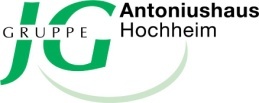
Antoniushaus gGmbH is a modern, charitable and non-profit service provider in Hochheim, Germany in the middle of the Rhine-Main region. "At the centre: the human being" - that is a promise to every pupil, every resident and every employee of our facility. We are specialised in offers for people with impairments: schools, boarding schools, living for adults, therapy and leisure.
You can find out who we are, what we stand for and the guidelines we use to shape our work here.
Contact person at Antoniushaus:
Jörg Rinkenberger, Professional Manager Therapy Department: 06146 908-140
Antoniushaus Hochheim gGmbH
Burgeffstraße 42
65239 Hochheim a. M.
06146 908-0
The AWO, Arbeiterwohlfahrt Kreisverband Frankfurt am Main e.V. [non-statutory welfare organisation], helps in many social areas. It is a professional service provider and offers its help wherever it is needed. Those who wish can also become active members of the AWO themselves.
Against the historical background as part of the labour movement, the actions of the AWO are shaped by the values of liberal-democratic socialism: solidarity, tolerance, freedom, equality and justice. The liberal-democratic socialism has been an important orientation of the Arbeiterwohlfahrt since its foundation. Its values have lost none of their relevance and importance.
Solidarity means standing up for one another through practical action, over and above legal obligations. Tolerance means not only tolerating other ways of thinking and behaving, but also working to ensure that everyone and especially minorities can express themselves freely, are not restricted in their religion and world view, and can live as they see fit. Freedom is the freedom of everyone, including those who think differently. Equality is based on the equal dignity of all human beings. Justice demands a balance in the distribution of work and income, property and power, but also in access to education, training and culture.
DIALOGMUSEUM is an adventure museum and a private social enterprise. The primary goals of the inclusion operation are to raise public awareness and acceptance of disabled and socially disadvantaged people, to promote their social integration and to create jobs in the primary labor market that reveal their potential and strengthen social participation. The centerpiece is the licensed "DIALOGUE IN THE DARK - an exhibition to discover the invisible", through which blind and visually impaired people guide. This creates a unique role reversal and change of perspective that makes inclusion tangible and raises awareness of disability, accessibility, dialogue, empathy and senses. The concept and associated brands are the intellectual property of Dialogue Social Enterprise GmbH (DSE/ www.dialogue-se.com). The international company pursues the mission of promoting social participation of people with disabilities, disadvantaged and elderly people on a global scale through exhibitions and workshops. It forms a worldwide network of independent franchise partners with currently 25 locations in Africa, Asia, Australia, Europe, North and South America and the Middle East. In addition to guided exhibition visits for individuals, groups and school classes, the current museum offering includes the full-body experience KlangRaum. Accompanying exhibitions in the bright museum rooms, educational workshops for school classes, corporate workshops, children's birthday parties as well as event activities extend the offer.

The aim of the Frankfurt Forum for Interdisciplinary Ageing Research (FFIA) is to foster empirical research on “aging well” in an interdisciplinary exchange of life, cultural and social science perspectives, emphasizing conditions, processes and consequences of normal aging from relatively resource-rich to relatively resource-poor circumstances in later life. In addition, the aim is to provide and communicate sustainable planning and decision-making bases for researchers, service providers, practitioners and the public. In general, aging is not seen as a deficit or a disease, but as a normal part of life, which more and more people are experiencing as they move into later life.
The forum’s specific orientation results from the common research interests of the participating researchers along the fundamental question of how life can be shaped and mastered in the process of ageing, i.e. what individuals and society must learn and achieve in order to age well, contentedly and with dignity. This is made possible by bringing together social, educational, psychological, legal and medical expertise. This gives Frankfurt a specific profile as a location for ageing research that stands apart from the range of topics at other ageing research institutions in Germany.
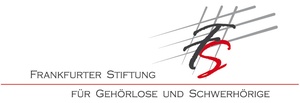
The Frankfurter Stiftung für Gehörlose und Schwerhörige [Frankfurt Foundation for the Deaf and Hearing Impaired] is committed to the requirements formulated in the UN Convention on the Rights of Persons with Disabilities (CRPD). It aims to contribute to the implementation of the UN Convention. To this end, it wants to constantly review and develop its services in this sense and support the self-help groups for people with a hearing impairment accordingly. The foundation is committed to accessibility, equal opportunities, equal participation and self-determination of deaf people and people with hearing impairments in everyday life in Frankfurt (and the surrounding area). Accordingly, its employees are particularly qualified in the topic of "people with hearing impairments".
More than 150 years of the Frankfurter Stiftung für Gehörlose und Schwerhörige (formerly "Stiftung Taubstummenanstalt") stand for care, help for self-help and social commitment for deaf people and people with hearing impairments. The foundation was established on 15 March 1861 with the purpose of ensuring the continued existence of the “Taubstummenanstalt” that had been established in Frankfurt am Main. Its actual history and thus the history of deaf-mute education in Frankfurt began as early as 1827, when Ludwig Kosel first taught deaf-mute children in Frankfurt. When Johannes Vatter, a school councillor, took over the management of the Frankfurt deaf-mute institution in 1874, this institution and its foundation became known in Germany and beyond through him.
The “Taubstummenanstalt” was demolished in the early 1970s due to damage caused by bombing during the Second World War. The foundation itself remained intact and only the purpose of the foundation was changed. A "Gehörlosen- und Schwerhörigen-Zentrum" [centre for deaf and hearing-imparied people] was established in 1977 and led to a change of name to the “Frankfurter Stiftung für Gehörlose und Schwerhörige” in 2008. In its museum, the foundation offers an overview of the history of the deaf people and people with hearing impairments that is unique in Germany. Within the framework of FUTURE AGING, this exhibition was further developed together with the Frankfurt University of Applied Sciences and the Sozialverband VdK Hessen-Thüringen e.V. [Social Association VdK Hesse-Thuringia e.V.] into the exhibition "Hello Freedom! Together beyond Barriers" and thematically expanded, for example to include assistive technologies.
For seventy years, the Sozialverband VdK Hessen-Thüringen e.V. [Social Association VdK Hesse-Thuringia e.V.] has stood up for social justice and the interests of its members. In this way, it provides valuable assistance in all matters relating to health, disability, pensions and care.
Founded in 1946 as a self-help organisation for war victims, the association has undergone profound changes over the years. Today, socio-political influence, a wide range of services on social law, pensions, health and disabilities, and solidarity in voluntary work form the foundation of a strong community.
The Sozialverband VdK is active throughout Germany. It has 13 legally independent regional associations. The third largest of these has its headquarter in Frankfurt am Main.
Since 1998, there has been the exhibition “Barrierefreies Wohnen und Leben” [Barrier-free Living and Housing] in cooperation with the Sozialverband VdK Hessen-Thüringen e.V. at Frankfurt UAS. Within the framework of FUTURE AGING and with the Frankfurter Stiftung für Gehörlose und Schwerhörige as a further partner, it was further developed into the exhibition “Hallo Freiheit! Zusammen über Barrieren” [Hello Freedom! Together beyond Barriers]. Since 2020, the new exhibition provides interactive and dialog-oriented information on assistive technologies, barrier-free concepts and the history of the deaf.
The Stabsstelle Inklusion is part of the Dezernat für Soziales, Jugend, Familie und Senior:innen [Department for Social Affairs, Youth, Family and Senior Citizens] of the City of Frankfurt. It promotes inclusion and accessibility in many areas. The goal is the self-evident and self-determined participation of people with disabilities in all areas of life. In addition to inclusion projects (e.g. in the cultural sector), it is also about barrier-free accessibility to buildings and information. Accessibility is not only understood in structural terms. Communication should also be barrier-free so that all people have access to information.
The City of Frankfurt's Commissioner for the Interests of People with Disabilities is also part of the Stabsstelle Inklusion. His main task is to ensure accessibility in all public buildings, in local public transport and in public spaces.
Background: With the ratification of the United Nations Convention on the Rights of Persons with Disabilities in 2009, the Federal Republic of Germany committed itself to taking appropriate measures to ensure that self-determination and equal participation in social life become a matter of course for all people, whether with or without impairments. The City of Frankfurt am Main is also committed to this obligation. The preamble to the Convention points out that people with disabilities make a valuable contribution to the general well-being and diversity of our community. It emphasises that the promotion of the full enjoyment of human rights and fundamental freedoms by people with disabilities, as well as their full participation, leads to significant progress in the human, social and economic development of society.
![[Translate to EN:] Logo des Zemtrums für Forschung und Kooperation der Hochschule für Wirtschaft und Gesellschaft Ludwigshafen](/typo3temp/assets/images/_csm_HSL-Logo-GER_ZFK_CMYK_small_d10f2a2f34_adab192767.jpg)
The Zentrum für Forschung und Kooperation (ZFK) [Centre for Research and Cooperation] is a service point for all research-relevant topics at the Ludwigshafen University of Business and Society, including research funding, doctoral studies, founding/start-up and the new overarching research area "Transformation Processes in Economy and Society" with research foci such as "Dealing with Social, Ecological and Economic Resources" and "Health".
Contact person at ZFK: Holger Roßberg Holger.Rossberg(at)hwg-lu.de
Employees of the FUTURE AGING research centre and the four faculties of the Frankfurt University of Applied Sciences are also among the associate members:

![[Translate to EN:] Logo Sozialverband VdK Hessen-Thüringen](/fileadmin/_processed_/8/6/csm_Logo_VdK_Hessen-Thueringen_a230ff064b.gif)
![[Translate to EN:] Frankfurter Stiftung für Gehörlose und Schwerhörige](/fileadmin/_processed_/e/1/csm_logo_FGLS_5589fabc61.jpg)
![[Translate to EN:] Frankfurter Forum für interdisziplinäre Alternsforschung](/fileadmin/_processed_/2/0/csm_Logos_FFIA_blau_3Z_52fc6eed87.jpg)

![Druck [Translate to EN:] Stadt Frankfurt Inklusiv](/fileadmin/_processed_/4/8/csm_Stadt-Frankfurt-Inklusiv-100_175f59ae29.jpg)
![Logo-Rellate-alle-eps-blau [Translate to EN:] Research Lab for Law and applied Technologies](/fileadmin/_processed_/9/e/csm_Logo-Rellate-A3_3fe9b8f757.jpg)
![[Translate to EN:] Smart Living Hessen Cluster](/fileadmin/_processed_/b/9/csm_Smart_Living_Logo_34bbd1abf9.png)
![[Translate to EN:] Pure Sec Firma Pure Life Assistenzsysteme](/fileadmin/_processed_/b/7/csm_Logo_PureSec_Future_Aging_8383a3386b.jpg)
![[Translate to EN:] Smart Skript [Translate to EN:] Smart Skript](/fileadmin/_processed_/c/e/csm_Logo_smartskript_b21a7e6c0b.jpg)
![[Translate to EN:] Logo Zentrum für Forschung und Kooperation Hochschule für Wirtschaft und Gesellschaft Ludwigshafen](/fileadmin/_processed_/a/c/csm_HSL-Logo-GER_ZFK_CMYK_small_2b6f04c9f1.jpg)




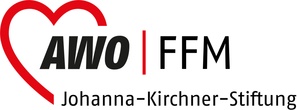
![[Translate to EN:] Logo Dialogmuseum Frankfurt](/typo3temp/assets/images/_csm_Dialog-Museum_Frankfurt_Logo_40db0806eb_05c30a62d0.jpg)
